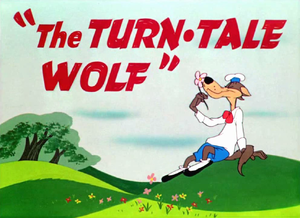The Turn-Tale Wolf
| The Turn-Tale Wolf | |
|---|---|
| Production company | Warner Bros. Cartoons |
| Distributor | Warner Bros. Pictures The Vitaphone Corporation |
| Release date | June 28, 1952 |
| Starring | Mel Blanc |
| Producer(s) | Edward Selzer |
| Music composition | Carl Stalling |
| Story | Tedd Pierce |
| Animation | Phil DeLara Charles McKimson Herman Cohen Rod Scribner Keith Darling (uncredited) |
| Director(s) | Robert McKimson |
| Series navigation | |
| ← Previous | Next → |
| Title card | |

| |
The Turn-Tale Wolf is the three hundred and fifty-second Merrie Melodies theatrical short. It was released by Warner Bros. Pictures and The Vitaphone Corporation on June 28, 1952. It was produced by Edward Selzer, written by Tedd Pierce, and directed by Robert McKimson.
When the Wolf's nephew comes to visit his uncle and berate him for blowing down the Three Little Pigs' houses, the Big Bad Wolf himself tells his own perspective of what happened in the story.
Detailed summary
Memorable quotes
Three Little Pigs: Swat da fly! Swat da fly! Swat da fly! Swat da fly!
Big Bad Wolf: So you see, my little nephew. It was dose doity pigs dat blew my house down in, and made off with me tail.
Wolf's nephew: Oh, unc! What a lot of malarkey!
Big Bad Wolf: Does dis look like malarkey?!
(cartoon irises out, but the Wolf opens a small door and speaks to audience)
Big Bad Wolf: Of course, we know I lost it in da swingin' door.
Characters
In order of appearance: | ||||||||||
| ||||||||||
Locations
- Earth
- Forest
- School
- Big Bad Wolf's shack
- Three Little Pigs' houses
- Forest
Objects
- Moonshine still
- The Three Little Pigs
Production
Development
Filming
Music
The music was composed by Carl W. Stalling.
Crew Credits
- Layouts: Peter Alvarado
- Backgrounds: Richard H. Thomas
Release
Dates are in order of release:
- United States: June 28, 1952 in theatres
Behind the scenes
- The portrayals of the Three Little Pigs from The Windblown Hare return in this short.
- This cartoon's plot is similar to the 1941 cartoon, The Trial of Mr. Wolf, but with the story of the Three Little Pigs.
Legacy
- The Big Bad Wolf's nephew would return in two more shorts: Now, Hare This and False Hare; although in the case of the last two appearances, he was given a different visual design.
Critical reception
In other languages
| Language | Name | Meaning |
|---|---|---|
Home availability
- In the United States: